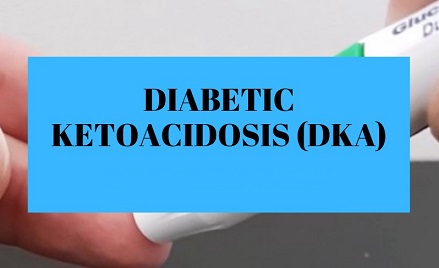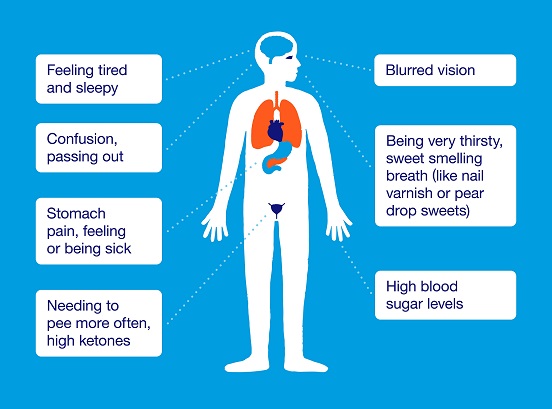BREAKING NEWS! Researchers Warn That COVID-19 Could Be Causing Rise Of Diabetic Ketoacidosis Incidences!
COVID-19-News - Diabetic-Ketoacidosis Jul 28, 2023 1 year, 8 months, 3 weeks, 13 hours, 46 minutes ago
African Study Showed Alarming Rise In The Life Threatening Condition Of Diabetic Ketoacidosis As A Result Of COVID-19 Surges
COVID-19 News: The COVID-19 pandemic has swept across the world, leaving devastation in its wake. Not only has it affected millions of lives directly through infection, but it has also had far-reaching consequences on various health conditions. One alarming concern that researchers have been investigating is the potential link between COVID-19 and the rise of new onset diabetic ketoacidosis (DKA).

Diabetic ketoacidosis (DKA) is a life-threatening problem that affects people with diabetes. It occurs when the body starts breaking down fat at a rate that is much too fast. The liver processes the fat into a fuel called ketones, which causes the blood to become acidic.
Researchers from the University Hospital of Farhat Hached-Tunisia and the University of Sousse-Tunisia conducted an African study to shed light on this potential association. They aimed to compare the incidence of new onset DKA before and during the COVID-19 pandemic, focusing on the types of diabetes mellitus involved.
The study spanned a four-year period, from March 2018 to February 2022, and centered on the diabetology department of the University Hospital Farhat Hached Sousse, Tunisia. The study population included patients hospitalized for new onset DKA, divided into two groups: G1 represented cases before the COVID-19 pandemic, and G2 included cases during the pandemic. Patients under the age of 14, those with new onset DM not presenting with DKA, and other types of diabetes were excluded from the study.
The findings of the study were concerning. A total of 340 patients were included, with 137 registered before the pandemic and 203 during the pandemic, representing a significant 48.17% increase. The mean monthly incidence of new onset DKA during the COVID-19 pandemic was statistically higher than before the pandemic, with 8.42 ± 4.87 DKA cases per month compared to 5.75 ± 4.29 DKA cases per month (p=0.049). Moreover, the temporal trend of DKA over the four-year study period showed a significant upward trend, indicating an increase in DKA cases that predated the pandemic, but the incidence spiked during the pandemic, with an average monthly percentage of change (AMPC) of +0.2% (p=0.037).
To delve deeper into the types of diabetes involved, the study team analyzed the incidence of both type 1 diabetes (T1D) and type 2 diabetes (T2D) during the COVID-19 pandemic. They observed a 50% increase in T1D cases and a 44% increase in T2D cases during the pandemic, compared to the pre-pandemic period. Past studies and
COVID-19 News reports have also confirmed that SARS-CoV-2 infections triggers the onset of diabetes in many.
Furthermore, the study investigated the presence of anti-glutamic acid decarboxylase (anti-GAD) antibodies, which are markers of autoimmunity in T1D. Interestingly, the titers of anti-GAD antibodies were significantly higher in G2 (during the pandemic) compared to G1 (before the pandemic), providing further evidence of a potential link between COVID-19 and the autoimmune response triggering T1D.
&
lt;br />
Various hypotheses have been put forward to explain the potential association between COVID-19 and the rise of DKA. One possibility is that delays in diagnosing new-onset diabetes may have occurred due to the fear of contracting the virus, leading to more severe DKA cases upon diagnosis.
However, the study did not find a significant difference in the duration of symptoms preceding DKA between the two study groups, which challenges the delayed diagnosis theory.
Another plausible explanation is that SARS-CoV-2, the virus responsible for COVID-19, directly damages pancreatic beta cells, leading to insulin-dependent diabetes and subsequent DKA. Research suggests that SARS-CoV-2 could trigger autoimmunity or promote insulin resistance, which further supports the potential link between COVID-19 and the development of DKA.
Furthermore, the study's findings align with international trends of an increase in DKA cases during the COVID-19 pandemic. In other parts of the world, studies have reported a significant rise in DKA presentations, exceeding predicted prevalence rates, pointing to the pandemic as a potential contributing factor.
 Symptoms Of Diabetic Ketoacidosis
Symptoms Of Diabetic Ketoacidosis
The rise in T1D cases during the pandemic is also consistent with findings from other studies worldwide, especially among the pediatric population. Research has suggested that viruses, including respiratory viruses, may trigger autoimmunity, leading to T1D development. The molecular mimicry hypothesis has been proposed as one of the mechanisms that mediate beta cell autoimmune injury, where the similarity between viral proteins and human insulin or GAD65 proteins could lead to immune cross-reactions, initiating T1D.
Similarly, the study revealed an increase in T2D cases during the pandemic, possibly due to COVID-19-induced insulin resistance. Some studies have reported higher levels of fasting insulin and proinsulin in patients with COVID-19, indicating an inflammatory basis for insulin resistance.
Additionally, the study highlights the potential influence of psychological distress, changes in eating behaviors, and the accountability of COVID-19 infection in precipitating DKA. Moreover, the management of DKA during the pandemic was affected, with longer resolution times, likely due to strategies aimed at reducing healthcare workers' exposure to the virus.
Despite the significant findings, the study acknowledges its limitations, such as its retrospective nature and single-center design. Nevertheless, the study team emphasize the importance of staying vigilant in monitoring and treating patients with diabetes, particularly during times of crisis like the COVID-19 pandemic.
In conclusion, the study provides valuable insights into the potential link between COVID-19 and the rise of new onset DKA, shedding light on the complex interplay between the pandemic and diabetes. As the pandemic continues to evolve, it is crucial for healthcare providers to remain vigilant in addressing the implications of COVID-19 on diabetes management and to explore avenues for improved preventive and management strategies in the face of such health crises.
The study findings were published in the peer reviewed journal: Frontiers In Endocrinology.
https://www.frontiersin.org/articles/10.3389/fendo.2023.1234256/full
For The latest
COVID-19 News, keep on logging to Thailand Medical News.

